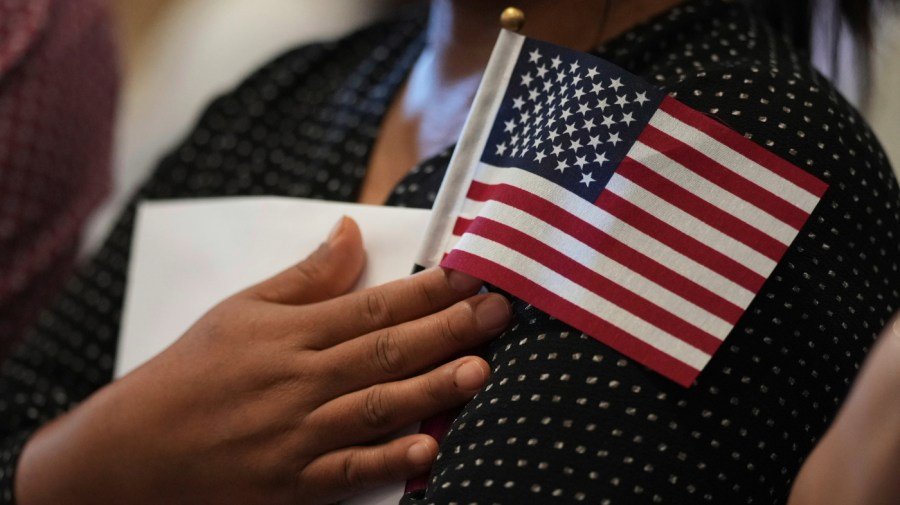
He began with an unconstitutional executive order purporting to restrict birthright citizenship for the first time in over 125 years. The administration’s latest move has been revising the naturalization test, making it harder, and perhaps impossible, for the most perceptive immigrants to become citizens.
In the past, aspiring citizens had to answer at least six of 10 questions correctly, in an oral examination drawn from a pool of 100. As of last week, however, new applicants will be given 20 questions, from a pool of 128, with a passing score of 12.
According to the director of the U.S. Citizenship and Immigration Service, the old test was “just too easy.” As explained by a spokesperson, the new test, in conjunction with “neighborhood investigations,” will weed out those who are not “fully assimilated” and cannot “contribute to America’s greatness.”
If the test accomplishes anything, it likely will subtly favor Trump-friendly immigrants, and disfavor MAGA skeptics.
In theory, tougher new questions have replaced softballs about geography or holidays, which had short, obvious answers. Thus, two questions about the oceans bordering the U.S. have been removed, superseded by supposedly more demanding ones.
That claim is belied by the recommended answers in the new USCIS study guide, which provides equally short, easily memorized answers to seemingly complex questions.
Question 111 asks “Why did the United States enter the Vietnam War?” The sole approved answer is, “To stop the spread of communism.”
Anyone who attempted to provide a nuanced or historically comprehensive answer — say, about geopolitical rivalry or control of resources — would risk being marked wrong, and perhaps branded an unassimilated threat to American greatness.
In an oral examination with open-ended questions, the only smart approach is to stick to the answer in the study guide. It isn’t any harder to remember “stop communism” than it is to memorize “Atlantic Ocean.”
Memorization aside, the test presents a profound problem for applicants who have been paying attention to the news. The approved answers plainly contradict the conduct of the Trump administration. For many of the civics questions, honest answers would likely be unacceptable, while the approved answers clash with Trumpian reality.
Question 6, for example, asks “What does the Bill of Rights protect?” The answer, which would have been accurate before Jan. 20, is “The basic rights of people living in the United States,” with no mention of citizenship or immigration status.
The Trump administration, however, has seized people “living in the United States” without warrants, and shipped them to a notorious prison in El Salvador without any semblance of due process required by the Fifth Amendment.
Citizens and non-citizens alike, including children, have found themselves detained, roughed up and zip-tied in violation of the Fourth Amendment’s prohibition on arbitrary search and seizure. Nor has the First Amendment protected international students whose visas have been revoked because they disagree with U.S. foreign policy.
Question 15 asks why there are “three branches of government.” The given answer is “So one part does not become too powerful.”
Trump, of course, has asserted virtually unlimited power under the “unitary executive” theory, including an assertedly unreviewable power to order armed troops into U.S. cities, over the objections of state governors, under the pretext of “insurrection” or “rebellion.”
He also ordered the demolition of the East Wing of the White House without first consulting the National Capital Planning Commission. The list goes on.
Likewise, Question 18 asks “What part of the federal government writes laws?” The answer is “Congress.” And Question 20 asks to “Name one power of the U.S. Congress?” “Making the federal budget” is an approved answer.”
Trump has set about governing by executive order, including the unilateral imposition of tariffs, which is a power specifically given to Congress under Article I of the Constitution. He has often ignored congressional budget legislation, repeatedly disregarding the Impoundment Control Act by freezing or withholding previously authorized appropriations, grants and even disaster relief funds.
Perhaps the new test is intended as a teaching vehicle by including the ostensible reasons for the Korean, Vietnam and Persian Gulf wars — communism, communism, and freeing Kuwait. There is no question about the Iraq War, perhaps because an answer about false intelligence reports wouldn’t “contribute to America’s greatness.”
In any case, the test has a decidedly right-wing tilt, with four questions or answers about the Federalist Papers, and two suggesting Trump’s preferred version of birthright citizenship.
Most Asian immigrants were ineligible for naturalization until 1952, under racist insistence that they could not be assimilated into American society. Over 70 years later, USCIS has revived the same rationale for denying naturalizations.
Question 124 asks for the meaning of the national motto “E Pluribus Unum.” The answer, “out of many, one,” is accurate for the time being. Under Trump, it may soon be changed to, “out of many, only the right ones.”
Steven Lubet is the Williams Memorial Professor Emeritus at the Northwestern University Pritzker School of Law.


